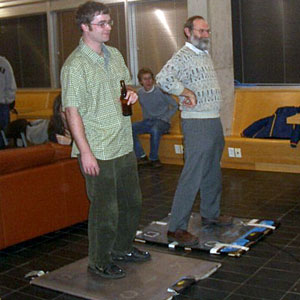 |
| Dr. Norman Scrimger shows off some dance moves with the DDR at a Geek Beer. (Photo Mike Smit) |
It's Friday night, you can hear Karaoke in the background and see a professor and a student standing a contraption that looks like two floor mats hooked up to a monitor. It's called the "Dance Dance Revolution" (DDR) and it looks like some sort of competitive dance game that makes people laugh hysterically.
Welcome to "Geek Beer," a regular event hosted by the Computer Science Society, where words like "linear algebra" and "algorithm" are tossed into sentences with ease.
The Computer Science Society is helping to change a dated perception that a career in computer technology means that employees are attached to their flat screen. Gone is the world of trade secrets and keeping knowledge to oneself. Here to stay are networking events and community-minded initiatives.
"Â鶹´«Ã½ computer science is student-centric. Our students are provided with e-mail accounts for life and we encourage them to keep us and their classmates informed on their journey through life," says Nick Cercone, Dean of Computer Science.
Colin Bate, a fourth-year computer science student who recently won a leadership award, agrees with this assessment. "Computer Science has a very strong sense of community. One faculty. One department. The Dean is visible to students and the faculty cares."
Both undergraduate and graduate students get a lot out of a society that reflects their academic and social needs, and is supported by the Faculty of Computer Science. The society also provides student representation on Faculty committees to help round-out discussions and decision making.
In addition, the society connects with its members and that is easily seen in their social events.
Graduate student Michael Smit (BSC '04) is a huge supporter of the society. "I was actively involved with the CS Society for several years and still participate in all their events." ÊThis is where "communication data mining" happens, in a fun and informal way - from ski trips to movie nights.
Twice a year, the Faculty offers awards and scholarships to energetic and committed individuals who build a community atmosphere. Ranging from $1000 to $3000, the Leadership and Citizenship Awards recognize students who contribute to the Computer Science Society. "I think it's a fantastic way for the Faculty to demonstrate that community spirit and social development is important to the personal and academic growth of our students," says Smit.
Whether it's a first-year student who is needs an "intro to Wiki" or a graduate student who needs academic advice, a strong support system exists.
"We have a lot of graduate students in Computer Science, who come from across Canada and from around the world. Graduate life is challenging and you need a strong support system to succeed. ÊThe Computer Science Society provides a structure that helps people get together," says Tara Whalen, a PhD student, and a recipient of a Citizenship Award.
In 2003, the Computer Science Society received accolades from the Â鶹´«Ã½ Student Union by being voted "Best Academic Society." This is well deserved recognition for a society that continues to creating opportunities for support, creativity, leadership and most importantly, socializing.
